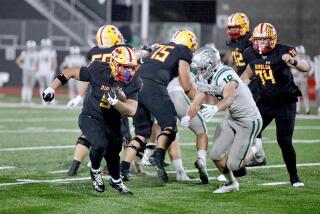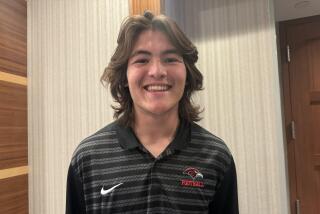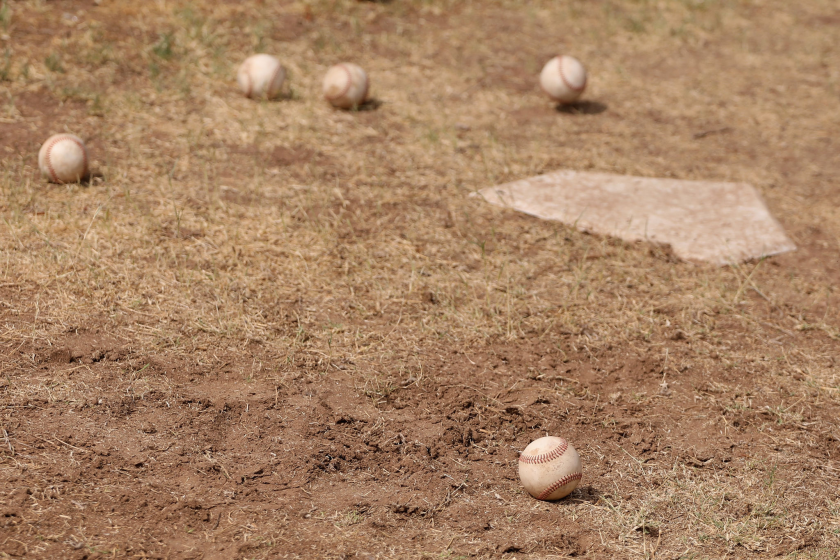Taking Root
- Share via
With the arrival of another high school football season, Joe Reed needs hot dogs. Two hundred and forty pounds should do.
That’s nothing compared to previous seasons. But during three decades of working in the snack bar at Birmingham High games, the 81-year-old man has seen tastes change.
“We used to sell 1,000 hot dogs a game,” Reed said. “Now it’s all nachos and French fries.”
So when Reed climbed into his pickup truck and drove downtown this week, he ordered just 240 pounds of wieners, just enough to be ready for the beginning of the season at 7 p.m. tonight against Canoga Park.
“You give people what they want,” he said.
Because football is more than flea flickers and safety blitzes. It is popcorn and soda, bright lights and marching bands, green grass and clean white bandages.
Even as coaches hone their game plans, even as players study their playbooks, all sorts of people on the fringe of the sport have been hurrying through preseason drills of their own.
THE BAND
Each summer at Notre Dame High, the marching band sweats through day-long practices on the same two fields where the football team has its workouts.
“We have a lot of appreciation for each other, for what each person has to go through,” said Lauren Fernandez, a junior who plays baritone saxophone. “A lot of band people have a lot of friends on the team.”
And just like the football squad--which lost All-American Justin Fargas to graduation last spring--the band is facing a rebuilding season.
“I lost half my kids from last year,” John Combes, the band director, said. “That’s an unusually large number.”
So his musicians have concentrated on fundamentals, playing endless scales, marching back and forth. The trick is to move without bouncing, without hitting any sour notes.
“It’s hard because you’re teaching your body to do something it’s not used to doing,” Fernandez said.
The band is a big deal at Notre Dame. Ninety musicians strong, it will perform at every game--home and away--as well as in parades and at the USC-Notre Dame game at the Coliseum.
But for Fernandez, nothing beats the feeling when the Knights take the field against Sylmar at home tonight.
“That first night, we’re out there in our uniforms and our plumes,” she said. “You can see it on everyone’s face. There is a massive amount of pride.”
THE DOCTOR
For Dr. Richard Ferkel, the football season begins with summer passing games.
“We see a lot of kids during the summer,” Ferkel said. “Some of them get dinged up in passing league. Some are still recovering from surgeries last season.”
Ferkel and the other doctors at the Southern California Orthopedic Institute in Van Nuys volunteer as team physicians for 15 high schools in the region. They also offer free clinics for athletes on Saturdays and Wednesdays.
This summer has been especially worrisome because of the heat. The doctor advised coaches to hold practices in the morning or late afternoon and to watch for fatigue, which increases the chance of injury. He reminded players to drink more fluids.
Once the season begins, Ferkel will attend dozens of games. Some weeks, he will be at one school on Friday night, at another on Saturday afternoon and yet another on Saturday evening.
“That’s probably the hardest thing,” he said. “We have to organize our schedules.”
There is a grim potential to working the sideline. The doctors’ equipment includes inflatable splints and special devices to cut through facemasks in the event of a head injury.
“I don’t like the injuries,” Ferkel said. “I don’t think anyone does.”
But that won’t keep him away from Friday night games.
“I don’t think any doctor should cover football games who doesn’t enjoy it,” Ferkel said. “I love watching the kids.”
THE OFFICIAL
Tony Cuppari won’t say how old he is.
“Old enough,” he said. “I’ve been officiating games for over 20 years.”
Friday night, Cuppari will begin another season as a referee when Highland plays Valencia at Canyon. He’ll be with the same crew--Larry Obar, Louis Vargas, Steve Strimling and David Musso--he has worked with for more than a decade.
“It’s easier when you know the guys,” he said. “We cover each others’ backs.”
Each preseason they spend time brushing up on mechanics and keeping abreast of the ever-changing rule book.
“We make a big deal out of it,” he said. “We have dinner at some restaurant. We stay there two or three hours.”
Like scores of officials across the region, they work scrimmages at high school practices to get back in the rhythm of making calls. Cuppari jogs and lifts weights, hoping to minimize the aches and pains each season brings.
“I’ll be waking up at 3 o’clock in the morning,” he said. “I get cramps. That’s the toughest thing for me.”
Still, he looks forward to that first kickoff.
“It’s a lot of fun,” he said. “Otherwise I wouldn’t be doing it.”
THE SNACK BAR
Football is a ritual for Joe Reed, a rite of fall that began 31 years ago when Birmingham built its stadium at the corner of Victory and Balboa boulevards. Reed didn’t have kids attending the school then. He just lived nearby.
“The whole neighborhood got involved,” he said. “People weren’t afraid to work.”
Reed can’t bear to be on his feet for hours at a time, so he can’t work the counter like he used to.
But he still helps clean the stands before each season. He drives to the store for bulk orders of chips and cheese and syrup for the soda machine. He keeps an inventory of the supplies.
“I’ve got a big list of things to do,” he said.
Just like the workmen who installed new lights at Taft.
Just like the Hueneme coach who tends to his football field with an edger.
And the Littlerock alumni who planted a three-ton boulder--a big rock at Littlerock--outside the entrance to the stadium.
They are part of the game, the sights and sounds of high school football. They are part of what makes up Friday nights.
A few years ago, Birmingham recognized Reed’s contribution by hanging an enormous sign on the snack bar at the east end of the field. It reads: Joe’s Place.
Even at 81, Reed plans on being around a while longer.
“You’re working around the young kids,” he said. “It keeps you young.”
More to Read
Get our high school sports newsletter
Prep Rally is devoted to the SoCal high school sports experience, bringing you scores, stories and a behind-the-scenes look at what makes prep sports so popular.
You may occasionally receive promotional content from the Los Angeles Times.







